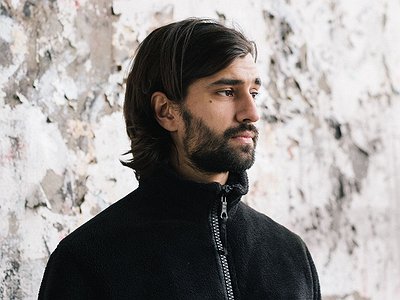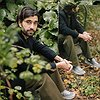Part 1
Name: Jeremy Olander
Nationality: Swedish
Occupation: Producer, DJ
Current Release: 'Karusell' EP on Vivrant
Recommendations: A lot of people have heard about it, but I haven’t met anyone who has actually read it. ’Sapiens’ by Yuval Noah Harari. It’s such an eye opener and a great explanation as to why things are the way they are today.
I would also recommend ‘The Handmaiden’ by Park Chan-Wook. The cinematography and story is a great piece of work. I’m a big Korean movie buff and he’s one of my favourite directors.
Website / Contact: For even more information about Jeremy Olander, visit his website or facebook profile.
When did you start writing/producing music - and what or who were your early passions and influences? What what is about music and/or sound that drew you to it?
I started playing around with Propellerheads’ Reason shortly after getting into dance music in high school. An old friend of mine showed me that you could make music on computers and that intrigued me. What made it so easy to get into was the basic setup and the fact that the music was instrumental so I didn’t need a singer. The whole idea of arranging the music was also very appealing to me. It reminded me of a lot of the strategic games I grew up playing, like Diablo and Starcraft. It’s almost like a puzzle once you have a few blocks of MIDI.
The genre itself wasn’t something I was instantly hooked on though. It took me a while. But just as today, typically the first dance music you are exposed to on radio isn’t the best and it wasn’t back then either. It took having friends showing me Steve Angello, Sebastian Ingrosso and Joachim Garraud’s podcasts to get me proper interested and start digging deeper on forums and blogs. I was 15 years ago so I was around 15-16 at the time so a bit too young to go out clubbing, but the older guys told me about a basement where everyone was playing called Grodan Cocktail Club. Thankfully a lot of the nights they had good bookings were Thursdays. So I guess the door security didn’t expect someone under 18 to go out on a weekday and I made it in most of the times. I still miss that place and I’m sure a lot of other producer and DJs from Sweden would agree. It was a seminal place. Seeing all these guys that later have gone on to sell out Madison Square Garden and other huge venues playing in a small sweaty bar for 120 people was so inspiring to me. I had never seen a performer interact with the crowd in such a way at other music shows before.
For most artists, originality is first preceded by a phase of learning and, often, emulating others. What was this like for you? How would you describe your own development as an artist and the transition towards your own voice? What is the the relationship between copying, learning and your own creativity?
For sure. I think it’s like that for most. I think it’s a great way to learn as well. I mean, when you’re taking piano lessons, the first thing you learn is to play "Für Elise" and then go on to learn other works before you can even consider writing your own pieces. It's definitely an approach I took when it came to learning how to produce. I would copy bits from here and there just to get into the habit of at least finishing up a track and after a while you just find your own way of doing things. I still use other tracks as mixing references. My studio setup is very basic and sometimes it can be hard to tell how things will sound on a big system, but that’s where comparing your music to a track you know sounds great comes in handy.
With that being said, if you continue straight up copying someone else's work, it's never going to be as big as the original and you won’t be bringing anything new to the table. You can get inspired by a small section of a track or maybe how someone has used FX and for me that's fine - as long as you blend it together with something that’s yours.
What were your main compositional- and production-challenges in the beginning and how have they changed over time?
I really struggled with mix downs and I still do. It was a real battle especially in the beginning, considering everything sounded sonically shit. I would stay up at night while still living with my parents and produce in bed, feel super happy with a track and then the next day it would just sound shit. The ideas were great, but just not sounding well. I guess I kind of set the bar a bit high comparing it to the works of Pryda, Trentemøller and Seb Legér, but it was also very motivating for me to work harder on it. I spent time on Laidback Luke’s forum where he would feedback literally every track that was posted. This was a time when dance music wasn’t as big as it is today, but it was still big deal for him to do that. I learned quite a lot there. At this time I had moved from Reason to Ableton and was digging deeper into external plugin synths.
What was your first studio like? How and for what reasons has your set-up evolved over the years and what are currently some of the most important pieces of gear for you?
My first studio, if you can call it that, was my laptop at my parents' place, and to be honest it hasn’t evolved that much since I first started 15 years ago. I use Logic as a DAW, Genelec monitors, an iMac, Apollo Twin sound card and a MIDI-keyboard. I like to keep it simple. I think production is about properly learning what you have to work with in and out, rather than looking at stuff you don’t have thinking it’s going to make a big difference for the end result.
How do you make use of technology? In terms of the feedback mechanism between technology and creativity, what do humans excel at, what do machines excel at?
I have a lot to thank technology for. I do all my productions on a computer for a few thousand dollars that anyone can get. Music production and the ability to reach an audience has been democratised thanks to technology. If you really think about it and compare to how the music business used to be, it’s really quite amazing. Before, you had to have all this studio equipment and pay big money to get in which made it impossible without a rich family or a major record label deal. I think that it made it possible for more artists to develop and experiment. But even if you have all these endless possibilities you still need to know how to use them. And that is where human creativity comes in.
Production tools, from instruments to complex software environments, contribute to the compositional process. How does this manifest itself in your work? Can you describe the co-authorship between yourself and your tools?
I love getting a new synth or a plugin and trying it out, but most of the times I end up using some of the more basic stuff that I have used since I started. The time it takes for me to dive into a new piece can get too consuming and complicated so I find myself just scrolling through presets. In the end to me what matters is the final result.






